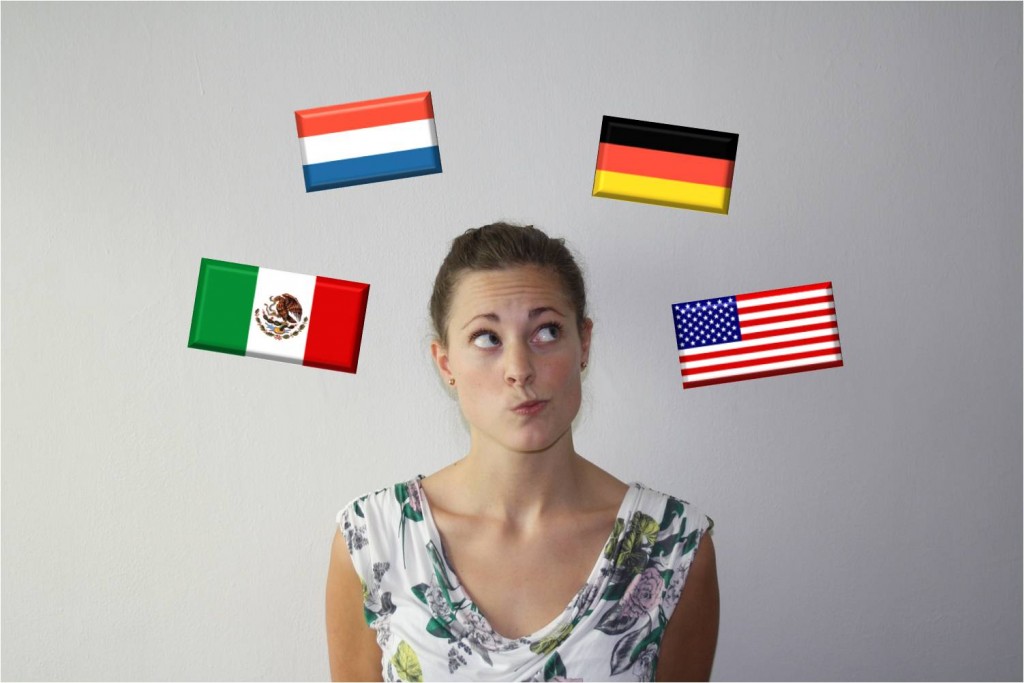For multilingual expats switching languages is daily business. While outsiders astonishingly enjoy our “show”, this linguistic performance is a pretty exhausting activity for our human brain.
I have been asking myself one crucial question:
Is it possible to speak multiple languages without mixing them up?
It´s the biggest challenge I am facing at the moment regarding improving my foreign language skills. I am not convinced yet whether mixing up languages can be entirely eliminated. Knowledge of previously acquired languages always seems to sneak into new languages. I am very ambitious to bring this to a minimum though. What about you?
How Come Multilinguals Mix Up Languages
Speakers easily transfer vocabulary, idioms, grammar and pronunciation across different languages. This is an inevitable phenomenon among adult language learners as someone’s native tongue or previously acquired languages form the basis for the new target language. In linguistics, this is called language transfer.
Language transfer can be either positive or negative. Positive transfer, as its name suggests, plays a positive role of facilitating the process of new language acquisition. Negative transfer, on the contrary, impedes it.
The “danger” of negative transfer is it´s rather unconscious nature. Even advanced speakers mostly don’t realize to which extent words and grammar leak incorrectly from one language into the other. To become a star in language switching, negative language transfer should be avoided as much as possible.
5 Tips to Improve Language Switching
I propose the following to pursue avoidance of negative language transfer:
Tip #1 – Analyze Your Mistakes
In order to avoid mixes of languages we need to become aware of our negative language transfer. Ask people to correct your mistakes, write them down and analyze them carefully. You will see that a large amount can be traced back to your native tongue or earlier acquired languages. Search for the right alternatives and you are one step ahead of little bastards being eager to sneak in ;-).
Tip #2 – Study to the Fullest
I know you won’t thank me for this advice – also multilinguals aren´t keen on grammar – but without knowing your language systems 100%, you won’t be able to recognize all the bits and pieces slipping into wrong languages. E.g. due to the fact that I don’t know German grammar to the fullest, it´s tempting to translate Dutch words and grammar structures literally but incorrectly. If Jan wouldn´t correct me as insistently as he always does, I would be speaking some weird mixed-language by now (in Dutch: steenkolenduits). A clear understanding of the differences and similarities between your language systems is the foundation for “leak” detection.
Tip #3 – Switch Often
One major cause of negative language transfer is the dominance of your native language over your foreign languages. Switching languages on a regular basis will give you the opportunity to practice and improve the less developed languages which reduces the dominance gap. Moreover, the more you are exposed to your foreign languages, the more opportunities you have to actively train yourself in recognizing and avoiding language transfer.
Tip #4 – Keep Your Languages Alive
Even if you don´t have daily access to foreign language interaction keep your languages at least alive. This avoids great dominance over the ones you do use in everyday life. Since I live day to day in a German/Spanish environment, I could easily let those languages take over and suppress my Dutch and English knowledge. As I don´t want to let this happen, I search actively for Dutch and English interaction and input. Be creative. Read. Write. Skype. Listen. Think. Watch TV. You don´t always have to speak to natives to keep languages active in your mind.
Tip #5 – Separate Languages on Purpose
Intentionally combining languages may look cool and impressive to the outside world, but you make it harder on yourself to switch languages properly. As a matter of fact, you are deliberately sabotaging the avoidance of negative language transfer. Moreover, this type of language use can result in distinctive language forms such as Spanglish, Frespañol, Dunglish and Portuñol. I don´t think that´s the average multilingual´s ambition. Constant exercise of keeping languages separated makes it easier to reach nearly-perfect language switching.
What other tips do you have to avoid mixture of languages? I would love to hear about your experience with keeping multiple languages apart. Please share your experience, ideas and feedback via the comment section below.

